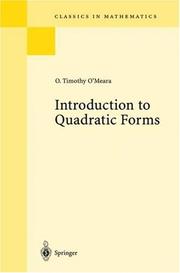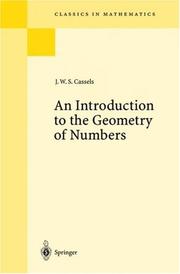| Listing 1 - 5 of 5 |
Sort by
|
Book
ISBN: 0841010145 Year: 1971 Publisher: Chicago (Ill.): Markham
Abstract | Keywords | Export | Availability | Bookmark
 Loading...
Loading...Choose an application
- Reference Manager
- EndNote
- RefWorks (Direct export to RefWorks)
Number theory --- 511.2 --- Number study --- Numbers, Theory of --- Algebra --- 511.2 Elementary number theory --- Elementary number theory
Book
ISBN: 0120657503 9780120657506 Year: 1971 Publisher: London Academic press
Abstract | Keywords | Export | Availability | Bookmark
 Loading...
Loading...Choose an application
- Reference Manager
- EndNote
- RefWorks (Direct export to RefWorks)
Number theory --- Data processing --- -Number study --- Numbers, Theory of --- Algebra --- -Data processing --- Number study --- Nombres, Théorie des --- Informatique --- Informatique. --- Number theory - Data processing - Congresses --- Nombres, Théorie des
Book
ISBN: 0821813234 Year: 1971 Volume: 4 Publisher: Providence, R.I.
Abstract | Keywords | Export | Availability | Bookmark
 Loading...
Loading...Choose an application
- Reference Manager
- EndNote
- RefWorks (Direct export to RefWorks)
Algebra --- Computer. Automation --- Number theory --- Algèbre --- Data processing --- Congresses --- Informatique --- Congrès --- -Number theory --- -Number study --- Numbers, Theory of --- Mathematics --- Mathematical analysis --- -Congresses --- -Data processing --- Algèbre --- Congrès --- Number study

ISBN: 3540029842 0387029842 3540665641 3642620310 9783540029847 Year: 1971 Volume: 117 Publisher: Berlin Springer-Verlag
Abstract | Keywords | Export | Availability | Bookmark
 Loading...
Loading...Choose an application
- Reference Manager
- EndNote
- RefWorks (Direct export to RefWorks)
Timothy O'Meara was born on January 29, 1928. He was educated at the University of Cape Town and completed his doctoral work under Emil Artin at Princeton University in 1953. He has served on the faculties of the University of Otago, Princeton University and the University of Notre Dame. From 1978 to 1996 he was provost of the University of Notre Dame. In 1991 he was elected Fellow of the American Academy of Arts and Sciences. O'Mearas first research interests concerned the arithmetic theory of quadratic forms. Some of his earlier work - on the integral classification of quadratic forms over local fields - was incorporated into a chapter of this, his first book. Later research focused on the general problem of determining the isomorphisms between classical groups. In 1968 he developed a new foundation for the isomorphism theory which in the course of the next decade was used by him and others to capture all the isomorphisms among large new families of classical groups. In particular, this program advanced the isomorphism question from the classical groups over fields to the classical groups and their congruence subgroups over integral domains. In 1975 and 1980 O'Meara returned to the arithmetic theory of quadratic forms, specifically to questions on the existence of decomposable and indecomposable quadratic forms over arithmetic domains.
Algebra --- Ordered algebraic structures --- Forms, Quadratic. --- Number theory. --- Matrix theory. --- Algebra. --- Group theory. --- Number Theory. --- Linear and Multilinear Algebras, Matrix Theory. --- Group Theory and Generalizations. --- Groups, Theory of --- Substitutions (Mathematics) --- Mathematics --- Mathematical analysis --- Number study --- Numbers, Theory of

ISBN: 3540617884 3540023976 3642620353 Year: 1971 Publisher: Berlin Springer
Abstract | Keywords | Export | Availability | Bookmark
 Loading...
Loading...Choose an application
- Reference Manager
- EndNote
- RefWorks (Direct export to RefWorks)
Reihentext + Geometry of Numbers From the reviews: "The work is carefully written. It is well motivated, and interesting to read, even if it is not always easy... historical material is included... the author has written an excellent account of an interesting subject." (Mathematical Gazette) "A well-written, very thorough account ... Among the topics are lattices, reduction, Minkowski's Theorem, distance functions, packings, and automorphs; some applications to number theory; excellent bibliographical references." (The American Mathematical Monthly).
511.9 --- 511.9 Geometry of numbers --- Geometry of numbers --- Number theory. --- Geometry. --- Number Theory. --- Mathematics --- Euclid's Elements --- Number study --- Numbers, Theory of --- Algebra --- Geometry of numbers. --- Numbers, Geometry of --- Number theory
| Listing 1 - 5 of 5 |
Sort by
|

 Search
Search Feedback
Feedback About UniCat
About UniCat  Help
Help News
News